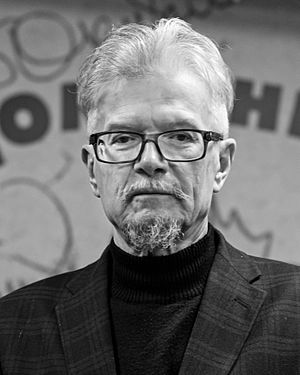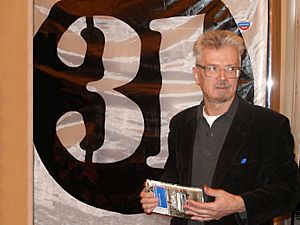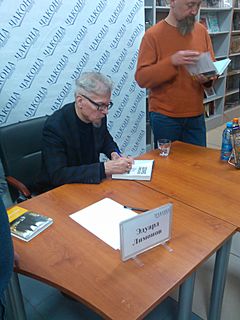Eduard Limonov facts for kids
Quick facts for kids
Eduard Limonov
|
|
|---|---|

Limonov in 2018
|
|
| Born | Eduard Veniaminovich Savenko 22 February 1943 Dzerzhinsk, Gorky Oblast, Russian SFSR, Soviet Union |
| Died | 17 March 2020 (aged 77) Moscow, Russia |
| Occupation | Writer, poet, essayist, publicist, leader of The Other Russia, former leader of the National Bolshevik Party, editor of newspaper Limonka |
| Nationality | Russian |
| Citizenship | Soviet (1943–74) Stateless (1974–1987) French (1987–2011) Russian (1992–2020) |
| Alma mater | Kharkiv National Pedagogical University |
| Period | 1958–2020 |
| Genre | Novel, poetry, short story, autobiography, political essay |
| Literary movement | Postmodernism (Russian postmodernism) |
| Notable works | It's Me, Eddie His Butler's Story A Young Scoundrel Memoir of a Russian Punk The Book of Water |
| Partner | Anna Rubinshtein Yelena Shchapova Natalya Medvedeva (1983–1995) Yekaterina Volkova |
| Children | Bogdan Alexandra |
Eduard Veniaminovich Savenko (Russian: Эдуард Вениаминович Савенко, IPA: [ɨdʊˈart vʲɪnʲɪɐˈmʲinəvʲɪtɕ sɐˈvʲenkə]), better known by his pen name Eduard Limonov (Russian: Эдуард Лимонов, IPA: [ɨdʊˈart lʲɪˈmonəf]), was a Russian writer, poet, and politician. He was born on February 22, 1943, and passed away on March 17, 2020.
He left the Soviet Union in 1974 but came back to Russia in 1991. There, he started a political group called the National Bolshevik Party. This party was later banned in 2007 and replaced by another group he led, The Other Russia. In the 2000s, he was a key leader in a group of different political parties called The Other Russia coalition.
About Eduard Limonov
Early Life and Beginnings, 1943–1966
Eduard Limonov was born in 1943 in Dzerzhinsk, an industrial city in the Soviet Union. His father worked in state security, and his mother was a homemaker. When he was young, his family moved to Kharkiv in the Ukrainian SSR, where he grew up. He studied at the H.S. Skovoroda Kharkiv National Pedagogical University.
Limonov said he started writing poetry when he was 13. He also got into some trouble as a teenager. During this time, he chose his pen name, Limonov, for his writing.
Life in Moscow, 1966–1974
In 1966, Limonov first came to Moscow with Anna Rubinstein. He earned money by sewing clothes for many well-known people. He moved back to Moscow in 1967 and later married another poet, Yelena Shchapova, in 1973.
During his time in Moscow, Limonov was part of a group of poets. He sold his own self-published poetry books while working different jobs. By the mid-1970s, he and his wife left the Soviet Union in 1974. The exact reasons for his departure are not fully clear, but he was asked to leave the country by authorities.
Living in New York, 1974–1980
Even though Limonov and Shchapova were not Jewish, the Soviet Union allowed them to move to Israel. However, they soon arrived in the United States. Limonov settled in New York City, where he and Shchapova later divorced.
He worked for a Russian-language newspaper, checking for mistakes. He also interviewed other people who had recently moved from the Soviet Union. Limonov was interested in punk subculture and different political ideas. He also became a target of the FBI, who questioned many of his friends.
Limonov's first novel, It's Me, Eddie, was finished by 1977. It was first published in France in 1980 and became very popular there. Limonov said that American publishers didn't want it because it wasn't written against the Soviet Union, which was popular at the time.
In New York, Limonov also experienced a difficult side of life. He lived in a cheap hostel and spent time with people who were homeless. He later found a job as a butler for a rich person. These experiences led him to write more books, including His Butler's Story.
Time in Paris, 1980–1991
Limonov became unhappy with the United States and moved to Paris, France, in 1980 with his partner Natalya Medvedeva. He became involved in French writing groups. He promised never to return to the United States, and he never did. After being without a country for 13 years, he became a French citizen in 1987. Limonov and Medvedeva married in 1982 but separated by 1995.
Return to Russia and Politics, 1991–2000
In 1991, Limonov returned to Russia from France. He got his Russian citizenship back and became active in politics.
During the 1990s, he supported certain groups in conflicts, such as those in Yugoslavia, Abkhazia, and Transnistria.
Limonov first worked with Vladimir Zhirinovsky and was even named as a minister in a "shadow government" in 1992. However, Limonov soon disagreed with Zhirinovsky, saying he was too moderate. Limonov then wrote a book called "Limonov against Zhirinovsky" in 1994.
In 1993, Limonov, along with others like Aleksandr Dugin and Yegor Letov, started the National Bolshevik Party. This party began publishing a newspaper called Limonka. The name "Limonka" is a Russian nickname for a lemon-shaped hand grenade, and it also played on Limonov's pen name.
In 1996, a Russian court ruled that the Limonka newspaper had spread illegal information. The court suggested that Limonov could be held responsible for promoting certain ideas. After this, a legal case was started against him.
On August 24, 1999, which was Ukrainian Independence Day, Limonov and 15 supporters stood on top of a clock tower in Sevastopol. They publicly called for the city's status to be changed and for a treaty between Russia and Ukraine not to be approved.
Legal Challenges and Protests, 2001–2013
Limonov faced legal issues and was imprisoned in April 2001. He was accused of planning to create an army. After spending a year in jail, his trial took place. He said the accusations were false and politically motivated. He was found guilty of some charges and sentenced to four years in prison. He was released early for good behavior. While in jail, he wrote eight books.
In 2006, Limonov married actress Yekaterina Volkova. They had a son, Bogdan, and a daughter, Alexandra. They separated in 2008.
On April 19, 2007, the Moscow City Court banned the National Bolshevik Party, calling it an extremist group. The highest court in Russia supported this decision.
Limonov continued his political work as a leader of The Other Russia. He joined various protests and helped organize the Dissenters' Marches. He was detained by police several times during these protests, including in March 2007, April 2007, and January 2009.
In July 2009, he helped organize the Strategy-31 protests, which were held on the 31st of each month to support freedom of assembly.
Later, Limonov separated from some of the liberal opposition groups. In July 2010, he and his followers created a new political party called The Other Russia. However, it was not officially registered as a party in 2010 or in 2019.
Later Life and Passing, 2013–2020
From 2014, Limonov supported the annexation of Crimea and the self-declared DNR and LNR. He encouraged Russians to take part in the Russo-Ukrainian War.
Eduard Limonov passed away on March 17, 2020, in Moscow. Reports said he had been fighting cancer. Complications from surgeries and other health issues were given as the cause of his death.
Literary Works
Limonov's books are known for their honest and sometimes harsh view of the world. His novels are often like memoirs, telling stories from his own life as a young person in Russia and as an immigrant in the United States.
His works were quite shocking for Russian readers when they started to be published in the late 1980s. His book It's Me, Eddie was especially noted.
A Russian film director, Aleksandr Veledinskii, made a movie in 2004 called Russkoe ("Russian"), which was based on Limonov's writings.
In the late 1990s and early 2000s, Limonov regularly wrote for English-language newspapers in Moscow, such as "Living Here" and the eXile. These were the only places where he wrote articles in English. He asked the editors to keep his unique "terrible Russian-English style." While many of his articles were about politics, he also wrote on other topics, like giving advice to young people.
Literary Inspirations
Limonov said that his favorite poet was Velimir Khlebnikov. Some people also believe that the Japanese writer Yukio Mishima influenced Limonov's writing style.
Books and Films About Limonov
Eduard Limonov's life story is told in detail in a biographical novel called Limonov by Emmanuel Carrère, published in 2011. His life is also featured in the Adam Curtis documentary series Can't Get You Out of My Head. An English actor, Ben Whishaw, is set to play Limonov in a movie based on Carrère's novel.
Filmography
Documentaries
- Saratov (2003)
- Da, smert (2004), by Alyona Polunina
- The Revolution That Wasn't (2008), by Alyona Polunina
- Srok
Films
- Russkoe (2004), by Alexander Veledinsky – a movie based on several of Limonov's novels
See also
 In Spanish: Eduard Limónov para niños
In Spanish: Eduard Limónov para niños
 | Mary Eliza Mahoney |
 | Susie King Taylor |
 | Ida Gray |
 | Eliza Ann Grier |



